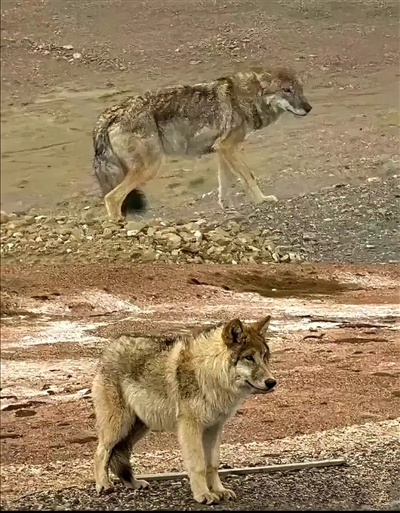A wolf in Hoh Xil was "fed to become fat into online celebrity" Expert: Feeding is not appropriate.

The contrast between online celebrity wild wolves before and after being fed is obvious.
Recently, some netizens released a video saying that a wild wolf in Hoh Xil, Qinghai Province, has been "judged as two wolves" because he is often fed by tourists and drivers in the past. Not only has his body become rounded, but he will also wag his tail and show his belly to the passing vehicles to beg for food. Subsequently, the wolf, who was "fed into online celebrity", quickly became popular, causing widespread concern and discussion among netizens. Some netizens ridiculed that this wolf has become "kind-hearted" and "don’t want to work hard" … … Some netizens also expressed concern that feeding at will may do bad things with good intentions.
It is not uncommon for wild wolves to be fed along some highways in Qinghai. In addition to wild wolves, brown bears and other wild animals are also fed. Experts in wildlife research said that the natural ecosystem is a complex food chain. It is a natural law that animals are born and die, and the survival of the fittest is eliminated. Human intervention in the survival law of wild animals is inappropriate and may have adverse consequences.
The reporter noticed that there have been cases of wild wolves begging for food and people feeding wild animals on the Internet. In July this year, a Ms. Kong released a video saying that she met a wolf begging for food while driving through Hoh Xil, so she got off the bus and fed the beef jerky used to feed the dog to the wolf.
This move has also aroused widespread concern and discussion. In an interview with the media, she said that the wolf was skinny and messy, as if she hadn’t eaten for a long time. She didn’t think much when feeding, so she felt that the wolf was poor, based on compassion for animals. However, she also said, "After all, wild animals are still dangerous, so it is not recommended that you imitate this feeding behavior." At the same time, the reporter noticed that in early October, some netizens posted a video of a scenic spot in Qinghai, and some tourists fed food to many brown bears, saying that brown bears often went to the village to beg for food, and the relationship between locals and brown bears was "harmonious".
In view of artificially feeding wild wolves, Chengdu Business Daily-Red Star reporter interviewed Dai Qiang, a researcher at Chengdu Institute of Biology, Chinese Academy of Sciences. Dai Qiang, who has been engaged in the research of wild animals such as giant pandas and wild wolves for a long time, has a negative attitude towards this. He believes that such behavior may also lead to animal dependence and have adverse consequences.
Dai Qiang said that feeding wild animals may bring risks to themselves on the one hand. Wild animals living in the wild, especially injured animals, may carry pathogenic bacteria; After all, the wolf is a beast, and it seems to be a tame wolf. There is no guarantee that it is aggressive, so try to keep a safe distance.
On the other hand, Dai Qiang thinks it is not advisable to interfere with the survival law of wild animals at will. "Unless it is an endangered species and it is caused by human factors, manual intervention is not recommended." Dai Qiang said that the natural ecosystem is a complex food chain. It is a natural law that animals are born and die, and the survival of the fittest is eliminated. Animal survival has its own laws. As a national second-class protected animal, wolves should be protected, but it is not recommended to rescue them too much. Moreover, this kind of behavior may also lead to the dependence of animals and have adverse consequences.
The reporter noticed that Qi Xinzhang, a popular science blogger and deputy director of Xining Wildlife Park, also left a message under the video saying that if wild wolves need ambulance, they should report to the forestry and grass department for professional ambulance and should not be fed at will. "I want to believe in the kindness of the feeder, but kindness needs rational support, otherwise it may be good to do bad things."